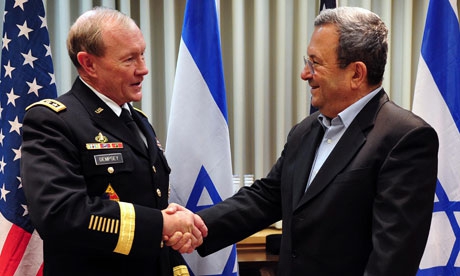
Arab spring has left US-friendly rulers in region nervous about possible impact of an Israeli strike on Iran's nuclear programme
US military�commanders have warned their Israeli counterparts that any action against�Iran�would severely limit the ability of American forces in the region to mount their own operations against the Iranian nuclear programme by cutting off vital logistical support from Gulf Arab allies.
US naval, air and ground forces are dependent for bases, refuelling and supplies on Gulf Arab rulers who are deeply concerned about the progress Iran has made in its nuclear programme, but also about the rising challenge to their regimes posed by the Arab spring and the galvanising impact on popular unrest of an Israeli attack on Iran.
The US Fifth Fleet is headquartered in�Bahrain�and the US air force has major bases in Qatar, Kuwait, Bahrain, the United Arab Emirates and Oman. Senior US officers believe the one case in which they could not rely fully on�those bases�for military operations against Iranian installations would be if�Israel�acted first.
"The Gulf states' one great fear is Iran going nuclear. The other is a regional war that would destabilise them," said a source in the region. "They might support a massive war against Iran, but they know they are not going to get that, and they know a limited strike is not worth it, as it will not destroy the programme and only make Iran angrier."
Israeli leaders had hinted they might take military action to set back the Iranian programme, but that threat receded in September when the prime minister,�Binyamin Netanyahu, told the United Nations general assembly that Iran's advances in uranium enrichment would only breach Israel's "red line" in spring or summer next year.
Israel's defence minister, Ehud Barak, said this week in London that it was the Iranian decision this year to convert a third of the country's stock of 20%-enriched uranium into fuel (making it harder to convert to weapons-grade material if Iran decided to make a weapon) that had bought another "eight to 10 months".
Barak's comments appear to signal that Israel's new red line is an Iranian stockpile of about 200kg of 20%-enriched uranium in convertible form, enough if enriched further to make one bomb. Western diplomats argue the benchmark is arbitrary, as it would take Iran another few months to enrich the stockpile to 90% (weapons-grade) purity, and then perhaps another year to develop a warhead small enough to put on a missile. Even then Tehran would have just one nuclear bomb, hardly enough to make it a�nuclear weapons�power.
France's president,�Fran�ois Hollande, met Netanyahu in Paris on Wednesday but rejected the push for military action.
"It's a threat that cannot be accepted by France," Hollande said, arguing for further sanctions coupled with negotiations. A new round of international talks with Iran are due after the US presidential elections, in which Tehran is expected to be offered sanctions relief in return for an end to 20% enrichment.
Netanyahu argued sanctions had failed to stop Iran's nuclear programme and claimed Arab nations would be "relieved" if Iran was stopped from building nuclear weaponsa bomb.
Emile Hokayem, a senior fellow of the International Institute for Strategic Studies office in Bahrain, disagreed, saying: "I don't believe the Gulf states are praying for an Israeli attack.
"An attack would create difficult problems for them on the political level. They will be called on to denounce Israel, and they will want to stay out of it. The risk of regional war to them is huge," he said, but added that if Iran responded to an Israeli attack by lashing out at the US and its Arab allies, those restraints on the Gulf states' own response would be lifted.
The�UK government has told the US�that it cannot rely on the use of British bases in Ascension Island, Cyprus, and Diego Garcia for an assault on Iran as pre-emptive action would be illegal. The Arab spring has also complicated US contingency planning for any new conflict in the Gulf.
US naval commanders have watched with unease as the newly elected Egyptian president,�Mohamed Morsi, has made overtures towards Iran. US ships make 200 transits a year through the Suez canal. Manama, the Fifth Fleet headquarters, is the capital of a country that is 70% Shia and currently in turmoil.
Ami Ayalon, a former chief of the Israeli navy and the country's internal intelligence service, Shin Bet, argues Israel too cannot ignore the new Arab realities.
"We live in a new Middle East where the street has become stronger and the leaders are weaker," Ayalon told the Guardian. "In order for Israel to face Iran we will have to form a coalition of relatively pragmatic regimes in the region, and the only way to create that coalition is to show progress on the Israel-Palestinian track."
The Iran Project is not responsible for the content of quoted articles.











